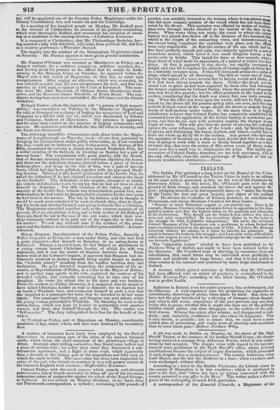A number of labourers have lately been employed by the
Earl of Shrewsbury in excavating part of the ruins of the ancient baronial castle, which forms the chief ornament of the picturesque village of Alton. Amongst other trifling curiosities, they found some bullets and a piece of ancient coin ; but a few days since they discovered a sub- terraneous apartment, and a flight of stone steps, which apparently form a descent to the bottom part of the stupendous and lofty rock on which the castle is built. The excavation has since been suspended by order of the earl, who intends to continue it to a still greater extent on his return to England next summer.—Staffordshire Examiner.
Colonel Pasley, with the usual success -which attends well-directed perseverance, has at length succeeded in firing off one of his enormous submarine mines of gunpowder against the wreck of the Royal George, at SOthead. At two o'clock on Monday afternoon, as WC learn from oar Portsmouth correspondent, a cylinder, containing 2,320 pounds of powder, was .carefully lowered.to the bottom, where it was placed alagg side the most 'compact portion of the wreck which has yet been :dig; verecl by the divers. This operation was effected by means of hauling. lines rove through blocks attached to the bottom of the ship by the divers. When every thing was ready, the vessel in which the voltaic battery was placed was drawn off to the distance of five hundred feet, which is the length of the connecting wires, and instantaneouslyaa the circuit being completed the explosion took place, and the effeets were very remarkable. At first the surface of the sea, which had be- fore been perfectly smooth and calm, was violently agitated by a sort of tremulous motion, which threw it into small irregular waves, a few inches only in height. This lasted for three or four seconds, when a huge dome of water made its appearance, of a conical or rather bee-hive shape. At first it appeared to rise slowly, but rapidly increased in height and size till it reached the altitude of twenty-eight or thirty feet, in a tolerably compact mass. It then fell dosvkand produced a series of rings, which spread in all directions. The first or outer one of these, having the aspect of a wave several feet in height, curled and broke, as if it had been driven towards the shore. Neither the shock nor the sound was so great as had been expected by those who had witnessed the former explosions by Colonel Pasley, where the quantity of powder was only forty-five pounds ; but the effect produced on the water at the surface, considering that the depth was ninety feet, was truly astonish- ing. What the effect has been upon the wreck, will not be fully ascer. tamed by the divers till the present spring tides are over, and the long periods of slack-water at the neaps enable the divers to remain for up- wards of half-an-hour under water. In the mean time, it is highly satisfactory to know that Colonel Pasley has completely established his command over the application of the voltaic battery to submarine poor: poses, and that he can now with certainty explode his charges at any depth of water. This will give him the power of placing g his cylinders against the most refractory parts of the 'wreck; and, by blowing these to pieces, and dislocating the knees, timbers, and beams, enable him to draw the whole up bit by bit to the surface. Any person who has seea the operation of breaking up a ship on land, knows that this is the only way of going to work with a mass so firmly bound together as a line- of-battle ship, that even the action of fifty-seven years of decay under water goes but a small way to disintegrate the parts. The manly per- severance of Colonel Pasley, therefore, we are well convinced, will, in the end, effectually clear the noble anchorage of Spithead of this ex- tremely troublesome obstruction.—Times.


























 Previous page
Previous page